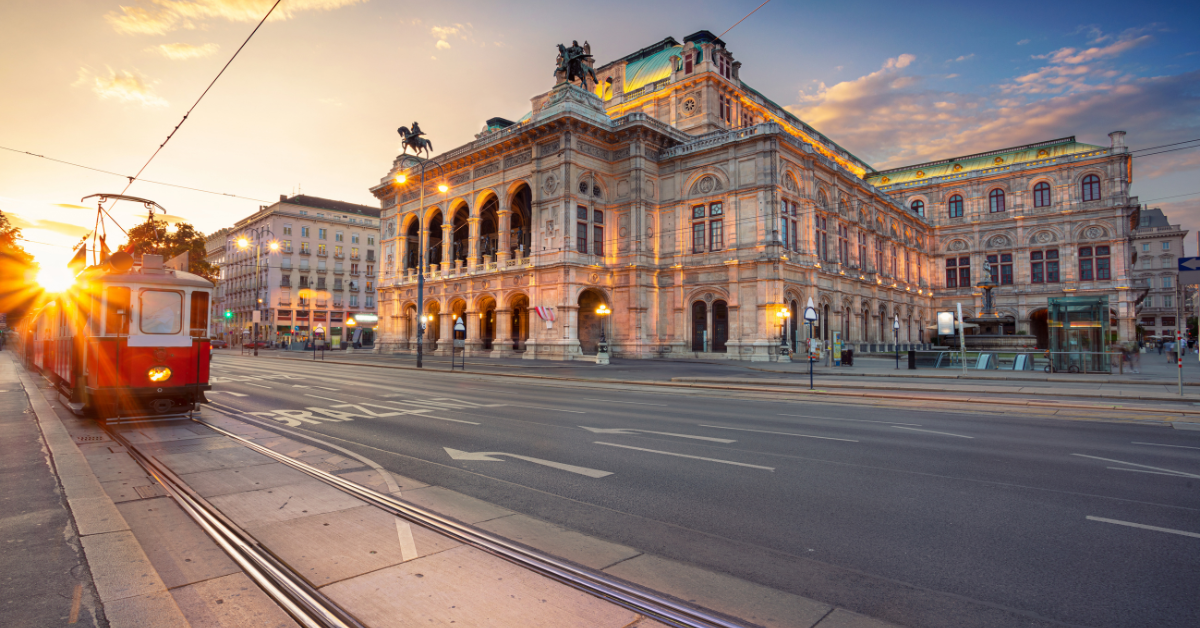Vienna, often called the City of Music, holds a special place in Japanese culture. In the past, it was written in kanji as “維納,” a symbolic expression that reflects not only the city’s sound but also its cultural depth and grandeur. This article explores why this expression was used and what kind of images Japanese people associate with Vienna.
Vienna’s Kanji Expression “維納”
In Japan, Vienna was once written as “維納.” From the Meiji era to the early Showa period, it was common for newspapers and books to record foreign cities in kanji instead of katakana.
The character “維” means “to support” or “to preserve,” while “納” means “to accept” or “to contain.” Together, they convey the image of a city that supports and embraces culture. This choice of characters shows that the intention was not only to match the sound but also to reflect the city’s stature and cultural depth.
Here are examples of foreign cities with their kanji expressions:
| City | Kanji Expression | Modern Expression |
|---|---|---|
| Vienna | 維納 | ウィーン |
| Paris | 巴里 | パリ |
| London | 倫敦 | ロンドン |
| Berlin | 伯林 | ベルリン |
| Moscow | 莫斯科 | モスクワ |
These expressions are rarely used today but remain in old documents and textbooks as a reflection of their era.
The Image of Vienna for Japanese People
For Japanese people, Vienna is strongly associated with the City of Music. Great composers such as Mozart, Beethoven, and Schubert lived and created here, and today, the Vienna Philharmonic Orchestra and the State Opera continue to fascinate audiences worldwide.
Vienna also symbolizes the center of art and culture. Its fin-de-siècle art and Secessionist architecture influenced Japanese literature and design during the Taisho period. In addition, the city’s elegant streetscapes, such as Schönbrunn Palace and St. Stephen’s Cathedral, reinforce the image of a refined and historical city.
Japanese perceptions of Vienna can be summarized as follows:
| Field | Japanese Image | Iconic Examples |
|---|---|---|
| Music | The world’s greatest classical city | Mozart, Vienna Philharmonic |
| Art | A hub of cultural innovation | Secessionist architecture, fin-de-siècle art |
| Urban Landscape | Elegant and historic scenery | Schönbrunn Palace, St. Stephen’s Cathedral |
| Lifestyle | Refined and graceful living | Café culture, Viennese balls |
Vienna’s Influence on Music and Education
Since the Meiji era, works of the Viennese school have been part of Japan’s music education. Pieces by Mozart and Beethoven became standard teaching materials, cementing the association of Vienna with classical music in Japan.
Furthermore, Japan’s piano and violin education was significantly shaped by Vienna. Japanese musicians who studied in Vienna brought back techniques and traditions, raising the standard of music education at home to international levels.
Vienna’s educational role can be summarized as follows:
| Area | Impact on Japan | Examples |
|---|---|---|
| School Education | Integration of Viennese works into curricula | Mozart in textbooks |
| Music Study Abroad | Skill improvement for Japanese musicians | Pianists and conductors trained in Vienna |
| Artistic Exchange | Inspiration for Japanese composers | Yamada Kōsaku and others |
Vienna Beyond the Arts: A City of Sports
Vienna is not only a cultural capital but also a city of sports. Football is especially popular, with Austria Wien and Rapid Wien being two of the most celebrated clubs, supported passionately by local fans.
The Vienna City Marathon is another highlight, attracting both residents and international participants. Tennis and ice hockey events are also hosted in the city, adding diversity to its sporting life.
The sports scene in Vienna can be summarized as follows:
| Sport | Characteristics | Main Stage |
|---|---|---|
| Football | Local clubs with strong fan support | Rapid Wien, Austria Wien |
| Marathon | Citizen-participation event with global appeal | Vienna City Marathon |
| Tennis | Hosts international tournaments | Indoor arenas in Vienna |
| Ice Hockey | Popular winter sport | Local team arenas |
Just as in music, sports unite people and create shared passion. Vienna is thus a city where culture and sports harmoniously coexist.
The Comprehensive Appeal of Vienna for Japanese People
For Japanese people, Vienna represents the City of Music, the City of Beauty, and the City of Sports. Travelers may enjoy operas and concerts, while also experiencing football matches or participating in the marathon, giving them a taste of everyday Viennese life.
Historically, Vienna has shaped Japanese culture through education and the arts, making it not only a destination but also a source of learning and admiration.
Conclusion
Vienna’s kanji expression “維納” was more than just phonetic transcription—it carried symbolic weight reflecting the city’s cultural importance. For Japanese people, Vienna is revered as the City of Music, admired as the center of art and culture, and embraced as a vibrant sports city.
Today, “ウィーン” in katakana is the common form, but “維納” still resonates with a sense of cultural connection between Japan and Vienna. Through music, art, and sports, Vienna continues to be a special city for the Japanese imagination.






